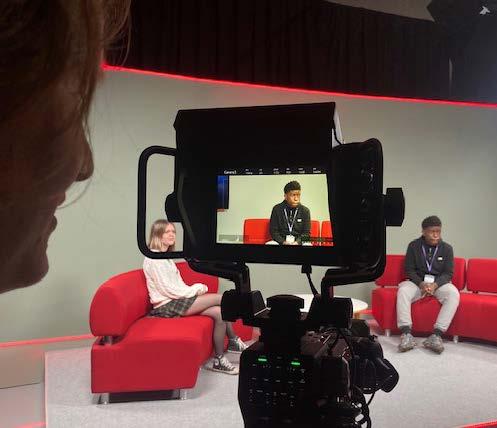





Our Media and Television Production programme offers students the opportunity to develop into multiskilled media practitioners as they explore the exciting and ever-evolving world of media. Through a range of industry-focused modules, our students gain the creative and practical skills and knowledge required to produce media content across different platforms and for different audiences.
The programme focuses on building a variety of professional and practical skills, from video and audio to scripts and pitches, while also ensuring that students learn how to analyse and critique a range of traditional and emerging media forms and texts. This underpinning theory enables students to explore media practice critically as well as practically.
As well as being experienced lecturers, the teaching team on the Media and Television Production programme includes staff who have a background in the media industry which ensures currency and relevance to the curriculum.
The Department of Music, Media and Performance has strong industry connections and is a vibrant, close-knit and supportive community of creative individuals.


As a Media and Television Production student, you will gain foundational creative and practical skills and competencies in the first year from audio and video recording to pitching an idea for the next big TV show! Students also examine media organisations and practices and develop skills to analyse Film and TV drama.
As you move through the programme, you will build on those foundational skills, competencies and basic knowledge to more advanced practice and application of theory. Year two offers a range of more specialised modules including Directing TV, which allows students to focus on drama or factual production, and Podcasts and Platforms: 21st Century Media Production, which focuses on the impact of emerging and dominant technologies and practices in media. There are also optional modules in the second year to enable students to make more choices to pursue their own subject interests and hone skills. For example, students could opt to take the Animation module.
There are two compulsory modules in the final yearFilmmakers of the Future: Producing scripted and non-scripted TV aims to hone the student’s skills and enable them to showcase their knowledge and understanding of media and specifically TV production. The Developing Professional Practice module focuses on the student’s own practice and career aspirations through a range of employability-focused tasks and assessments. There are also a number of optional modules in Year 3, including the written dissertation or the negotiated study module which allow students the opportunity to direct a documentary, work on a drama with peers or perhaps produce a podcast series.


Our excellent facilities at our Creative Campus in Chester include four large specialist rehearsal and performance studio spaces with lighting and sound rigs. Students also have access to a range of loan equipment including specialist cameras, audio recorders, lighting kits, portable green screens, tracks and dollies and 360 cameras. Creative Campus has technology suites where our Media and Television Production students can work on the post-production – editing, audio and effectsaspects of their work.
Our highly skilled technical support staff are on hand to support students with technical queries including booking out loan equipment, on-site facilities including studio spaces and with post production software (editing and effects).
For more information contact: Programme Leader, Dr Katie Barnett
e: k.barnett@chester.ac.uk
www.chester.ac.uk
For admissions enquiries: Undergraduate Admissions
University of Chester
Parkgate Road
Chester, CH1 4BJ
t: 01244 511000
e: enquiries@chester.ac.uk
For further information, please contact:
Department of Music, Media and Performance
Creative Campus, Kingsway
Kingsway
Chester, CH2 2LB
t: 01244 515855
e: mmp@chester.ac.uk
Like many universities across the UK, we are carefully planning for the next year to ensure the health and safety of our students and to ensure that however the situation may develop or change, the academic year will be completed for all students. This may mean we use some alternative modes of delivery to those described in this leaflet, but we’ll still be delivering a high quality learning experience. Further details will follow on our website once plans have been confirmed.